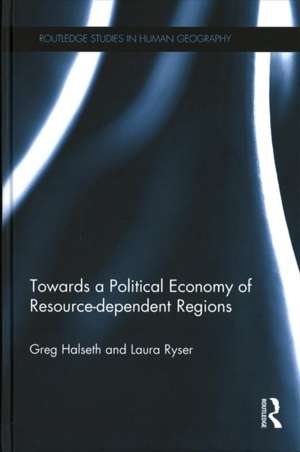Towards a Political Economy of Resource-dependent Regions: Routledge Studies in Human Geography
Autor Greg Halseth, Laura Ryseren Limba Engleză Hardback – 24 aug 2017
Towards a Political Economy of Resource Dependent Regions is a key resource for students and researchers in geography, rural and industrial sociology, economics, environmental studies, political science, regional studies, and planning, as well as policy-makers, those in industry and the private sector, and local and regional development practitioners.
| Toate formatele și edițiile | Preț | Express |
|---|---|---|
| Paperback (1) | 274.79 lei 6-8 săpt. | |
| Taylor & Francis – 10 iun 2019 | 274.79 lei 6-8 săpt. | |
| Hardback (1) | 1005.01 lei 6-8 săpt. | |
| Taylor & Francis – 24 aug 2017 | 1005.01 lei 6-8 săpt. |
Din seria Routledge Studies in Human Geography
-
 Preț: 326.49 lei
Preț: 326.49 lei -
 Preț: 371.71 lei
Preț: 371.71 lei -
 Preț: 326.49 lei
Preț: 326.49 lei -
 Preț: 341.08 lei
Preț: 341.08 lei - 18%
 Preț: 1057.75 lei
Preț: 1057.75 lei - 18%
 Preț: 1072.71 lei
Preț: 1072.71 lei - 12%
 Preț: 299.87 lei
Preț: 299.87 lei -
 Preț: 490.62 lei
Preț: 490.62 lei - 25%
 Preț: 823.63 lei
Preț: 823.63 lei - 18%
 Preț: 1058.79 lei
Preț: 1058.79 lei - 18%
 Preț: 1054.71 lei
Preț: 1054.71 lei - 13%
 Preț: 296.11 lei
Preț: 296.11 lei - 18%
 Preț: 1057.89 lei
Preț: 1057.89 lei - 25%
 Preț: 825.62 lei
Preț: 825.62 lei - 18%
 Preț: 732.06 lei
Preț: 732.06 lei -
 Preț: 414.32 lei
Preț: 414.32 lei - 18%
 Preț: 1062.98 lei
Preț: 1062.98 lei - 18%
 Preț: 702.31 lei
Preț: 702.31 lei - 18%
 Preț: 1057.09 lei
Preț: 1057.09 lei - 18%
 Preț: 1169.66 lei
Preț: 1169.66 lei - 18%
 Preț: 1114.98 lei
Preț: 1114.98 lei -
 Preț: 408.54 lei
Preț: 408.54 lei -
 Preț: 419.50 lei
Preț: 419.50 lei - 25%
 Preț: 823.08 lei
Preț: 823.08 lei -
 Preț: 373.59 lei
Preț: 373.59 lei - 5%
 Preț: 353.14 lei
Preț: 353.14 lei - 18%
 Preț: 1057.40 lei
Preț: 1057.40 lei - 18%
 Preț: 1058.69 lei
Preț: 1058.69 lei - 18%
 Preț: 1065.06 lei
Preț: 1065.06 lei - 18%
 Preț: 1060.87 lei
Preț: 1060.87 lei - 18%
 Preț: 1069.92 lei
Preț: 1069.92 lei -
 Preț: 418.65 lei
Preț: 418.65 lei -
 Preț: 446.58 lei
Preț: 446.58 lei -
 Preț: 408.74 lei
Preț: 408.74 lei -
 Preț: 423.30 lei
Preț: 423.30 lei - 18%
 Preț: 1055.51 lei
Preț: 1055.51 lei - 26%
 Preț: 878.82 lei
Preț: 878.82 lei - 18%
 Preț: 1061.57 lei
Preț: 1061.57 lei - 26%
 Preț: 849.84 lei
Preț: 849.84 lei - 18%
 Preț: 733.11 lei
Preț: 733.11 lei - 25%
 Preț: 855.05 lei
Preț: 855.05 lei - 12%
 Preț: 338.81 lei
Preț: 338.81 lei - 26%
 Preț: 764.20 lei
Preț: 764.20 lei
Preț: 1005.01 lei
Preț vechi: 1225.61 lei
-18% Nou
Puncte Express: 1508
Preț estimativ în valută:
192.31€ • 198.40$ • 160.48£
192.31€ • 198.40$ • 160.48£
Carte tipărită la comandă
Livrare economică 27 martie-10 aprilie
Preluare comenzi: 021 569.72.76
Specificații
ISBN-13: 9780415788427
ISBN-10: 0415788420
Pagini: 308
Dimensiuni: 156 x 234 x 24 mm
Greutate: 0.59 kg
Ediția:1
Editura: Taylor & Francis
Colecția Routledge
Seria Routledge Studies in Human Geography
Locul publicării:Oxford, United Kingdom
ISBN-10: 0415788420
Pagini: 308
Dimensiuni: 156 x 234 x 24 mm
Greutate: 0.59 kg
Ediția:1
Editura: Taylor & Francis
Colecția Routledge
Seria Routledge Studies in Human Geography
Locul publicării:Oxford, United Kingdom
Public țintă
Postgraduate and UndergraduateCuprins
Part 1: Introduction 1. Introduction 2. Social Geography and Political Economy Part 2: Organizing Structures 3. The Capitalist Economy 4. Global Capitalist System 5. Resource Regions in the Global Capitalist Economy Part 3: Mobilizing through Institutions 6. Institutional Trends 7. Large Companies, Big Labour; Small Businesses, Employees 8. Senior Government 9. Place-Based Communities and Local Government 10. Civil Society 11. Individuals Part 4: Change, Power, and Conflict in Resource-Dependent Regions 12. A Political Economy of Power and Conflict 13. A Political Economy of Resource Town Transition 14. Development Embedded in Places
Notă biografică
Greg Halseth is a Professor in the Geography Program at the University of Northern British Columbia, Canada, where he is also the Canada Research Chair in Rural and Small Town Studies and Co-Director of UNBC’s Community Development Institute. His research examines rural and small town community development, and local and regional strategies for coping with social and economic change.
Laura Ryser is the Research Manager of the Rural and Small Town Studies Program at the University of Northern British Columbia, Canada. Her research interests include small town community change, institutional barriers to change, building resiliency to respond to restructuring trends, labour restructuring, and rural poverty.
Laura Ryser is the Research Manager of the Rural and Small Town Studies Program at the University of Northern British Columbia, Canada. Her research interests include small town community change, institutional barriers to change, building resiliency to respond to restructuring trends, labour restructuring, and rural poverty.
Descriere
This book advances our understanding of resource-dependent regions in developed economies, exploring a range of geographical regions including Canada, USA, UK, Australia, and the Nordic countries. Resource production in remote, rural, and small town locations is certainly not new, and while change has always been a characteristic of these regions, the more rapid pace of transition and change for regions and economies through the contemporary global economy has been well underway for more than 30 years. How are we to understand these regions? How are we to understand the changes and transformations of their communities and economies? What elements in these changes reflect emergence, what elements reflect transition, and what elements reflect a continuity with the past? Where are the trajectories of change leading remote, rural, and small town resource-dependent regions? It is to these questions that this book is addressed.
